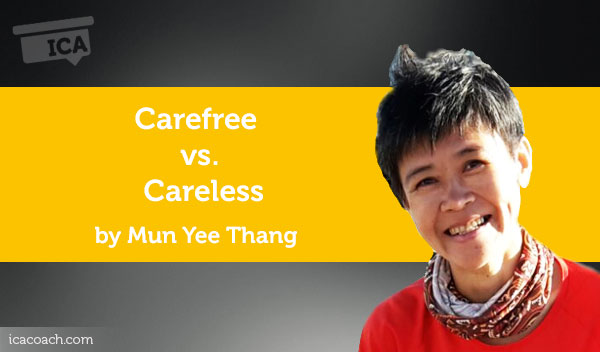
A Coaching Power Tool Created by Mun Yee Thang
(Life Coach, MALAYSIA)
Care
We can each reflect on the different things that we care for. They are a function of our goals, priorities and values. There is no right and wrong to it.
It’s probably not an exaggeration to say we are free from care only when we are dead.
To be carefree is not about doing away with what we care for. It’s about attending to them in the best way acceptable to us that we can move forward, carefree.
Being carefree is:
Being carefree allows us to approach ideas with respect and sensitivity, having awareness that the idea is deserving of just being. Underlying beliefs do not get in our way unintentionally causing us to be judgmental and hold preconceived notions of what must be.
When one is unable to be carefree, all the opposites of the above are true.
It is as if the road ahead is littered with obstacles. We see very clearly what failure is and are cowed by it – the shame, the pain and take it as a finality. We feel taking another step is just not worth it, not for any learning, opportunity or growth.
We become shackled by these fears – they may be real and rational. It is safer to stay still.
Caution – Being carefree is not being careless
Being careless means:
We work consciously at becoming carefree.
In order to achieve understanding in an area of care, we study the issues, the causes and the risks. With this understanding, we consider options, make informed decisions and take action.
This gives us confidence. Confidence calms our minds. We have our focus and our thinking is clear. We are not crippled by uncertainty.
A very high standard of care lies at the foundation and permeates our activities. Only then do we achieve a carefree state.
When we embark on something without similar preparation, we are simply careless. Running through a minefield with abandon is reckless and ignorant of the environment. Only in acknowledging the reality of the surroundings and finding a way to manage them can one be carefree in his approach.
Coaching Application
We may help our clients who are in a challenging experience with the following questions to gain a perspective of their situation:
We still acknowledge the difficulties but knowing that we are not lost at sea helps to work through with confidence.
Why is being carefree powerful?
Our focus is on building a foundation of ability in alignment with our values. Our thoughts, actions, structures all thus aligned.
One is carefree and not careless
Because one is knowing, not unknowing
Thus one is able to respond, not react
One has a plan, and is not a victim of chance
One has a view of the end, and thus savours the journey, not chasing its tail
Because one understands, one is appreciative and grateful, full of awareness
And one is happy
Reflections
- How might we devote limited resources to the things that we care for eg. the well-being of family, health, environment?
- Reflect on a situation that has given you cause for grave concern before. What was your state of mind when responding to the challenging situation? Did anything in particular help or hinder you from moving forward?
- What adjectives would you use to describe yourself in a careless state? In a carefree state? Can you describe any situation where you might find the standard of care excellent or conversely unacceptable?